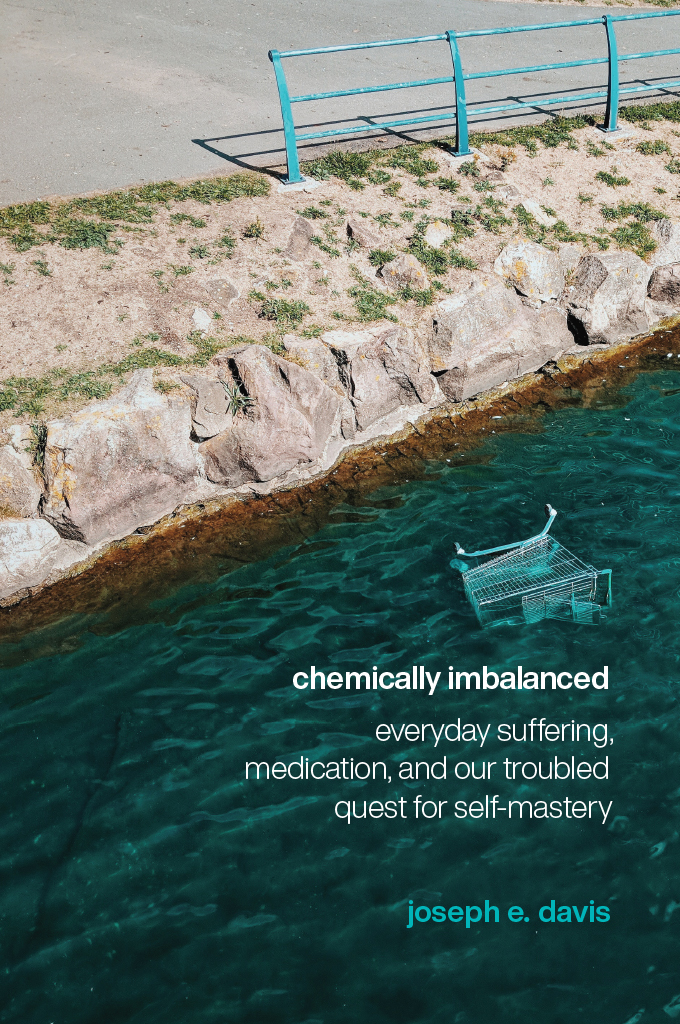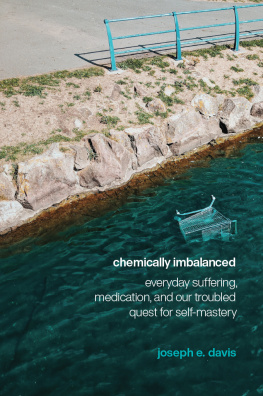Joseph E. Davis - Everyday Suffering, Medication, and Our Troubled Quest for Self-Mastery
Here you can read online Joseph E. Davis - Everyday Suffering, Medication, and Our Troubled Quest for Self-Mastery full text of the book (entire story) in english for free. Download pdf and epub, get meaning, cover and reviews about this ebook. year: 2020, publisher: University of Chicago Press, genre: Politics. Description of the work, (preface) as well as reviews are available. Best literature library LitArk.com created for fans of good reading and offers a wide selection of genres:
Romance novel
Science fiction
Adventure
Detective
Science
History
Home and family
Prose
Art
Politics
Computer
Non-fiction
Religion
Business
Children
Humor
Choose a favorite category and find really read worthwhile books. Enjoy immersion in the world of imagination, feel the emotions of the characters or learn something new for yourself, make an fascinating discovery.
- Book:Everyday Suffering, Medication, and Our Troubled Quest for Self-Mastery
- Author:
- Publisher:University of Chicago Press
- Genre:
- Year:2020
- Rating:5 / 5
- Favourites:Add to favourites
- Your mark:
- 100
- 1
- 2
- 3
- 4
- 5
Everyday Suffering, Medication, and Our Troubled Quest for Self-Mastery: summary, description and annotation
We offer to read an annotation, description, summary or preface (depends on what the author of the book "Everyday Suffering, Medication, and Our Troubled Quest for Self-Mastery" wrote himself). If you haven't found the necessary information about the book — write in the comments, we will try to find it.
Everyday Suffering, Medication, and Our Troubled Quest for Self-Mastery — read online for free the complete book (whole text) full work
Below is the text of the book, divided by pages. System saving the place of the last page read, allows you to conveniently read the book "Everyday Suffering, Medication, and Our Troubled Quest for Self-Mastery" online for free, without having to search again every time where you left off. Put a bookmark, and you can go to the page where you finished reading at any time.
Font size:
Interval:
Bookmark:

Joseph E. Davis
The University of Chicago Press
CHICAGO & LONDON
The University of Chicago Press, Chicago 60637
The University of Chicago Press, Ltd., London
2020 by The University of Chicago
All rights reserved. No part of this book may be used or reproduced in any manner whatsoever without written permission, except in the case of brief quotations in critical articles and reviews. For more information, contact the University of Chicago Press, 1427 E. 60th St., Chicago, IL 60637.
Published 2020
Printed in the United States of America
29 28 27 26 25 24 23 22 21 20 1 2 3 4 5
ISBN-13: 978-0-226-68654-7 (cloth)
ISBN-13: 978-0-226-68668-4 (paper)
ISBN-13: 978-0-226-68671-4 (e-book)
DOI: https://doi.org/10.7208/chicago/9780226686714.001.0001
Library of Congress Cataloging-in-Publication Data
Names: Davis, Joseph E., author.
Title: Chemically imbalanced: everyday suffering, medication, and our troubled quest for self-mastery / Joseph E. Davis.
Description: Chicago : University of Chicago Press, 2020. | Includes bibliographical references and index.
Identifiers: LCCN 2019025708 | ISBN 9780226686547 (cloth) | ISBN 9780226686684 (paperback) | ISBN 9780226686714 (ebook)
Subjects: LCSH: Affective disordersTreatment. | Neurobehavioral disordersTreatment. | Neurobiology.
Classification: LCC RC537 .D35 2020 | DDC 616.85/27dc23
LC record available at https://lccn.loc.gov/2019025708
 This paper meets the requirements of ANSI/NISO Z 39.48-1992 (Permanence of Paper).
This paper meets the requirements of ANSI/NISO Z 39.48-1992 (Permanence of Paper).
For Monica
We must rid ourselves of the delusion that it is the major events which have the most decisive influences on us. We are much more deeply and continuously influenced by the tiny catastrophes that make up daily life.
Siegfried Kracauer,The Mass Ornament
It is not to the different that one should look for understanding our differentness, but to the ordinary.
Erving Goffman,Stigma
We have all heard the story. The brain is the last scientific frontier and the unraveling of its mysteries is playing an increasingly central role in how we understand the world and ourselves. Breathless reports in the popular press and in the best-selling writing of scientists inform us that we are in the midst of a revolution, entering a new and enlightened era in which many of our most persistent human problems will be conquered. Biological explanations of mental life are sweeping away long-standing philosophical problemsmind-body and nature-nurtureand the vexing enigmas of human subjectivity and consciousness. Significant advances in genetics, biochemistry, and neuroscience are yielding breakthroughs in the understanding of neural mechanisms and the physiology of human thought, emotion, and behavior. Psychiatry, breaking free of its psychological past, is becoming clinical neuroscience and will soon transform the way it treats mental disorders. The days of the old folk psychology and such long outdated notions as the soul are finally coming to an end.
That is the story, and judging from the book sales figures, positive media coverage, and other evidence over the past several decades, neurobiological accounts of mind, self, and behavior have been eagerly embraced by the general public. Why? The enthusiastic reception, it seems safe to say, is not in response to the discrediting of the old philosophies, or the appearance of new treatments, or the scientific discovery of new phenomena. Though there are countless new insights, the reality is far more pedestrian than the hype. There is little settled knowledge of disorders or treatments or the relationship of mind to body. In fact, many of the claims about the relation of mind and mental states to brain are not really scientific at all and cannot themselves be tested in any empirical way. They rest not so much on a theory as on changed assumptions about human being. While the promise of neuroscience responds to a widespread yearning for concreteness and a promise of unambiguous solutions to intractable problems, the explanatory force of its insights and their actual productivity is not nearly enough to explain the public appeal.
Something else, something in our common culture, is afoot. This book is a field report on how ordinary people dealing with painful everyday struggles with loss and failure and limitation engage with the new and psychologically depthless talk of neurobiology. These encounters, in turn, serve as a kind of stethoscope on our underlying condition, on a change in the way that we imagine ourselves and how to get on in our world.
Like many of her college peers, Kristin, twenty-one, had experimented with Adderall. Her first encounter with the preferred medication for treating attention deficit/hyperactivity disorder (ADHD) came at a party, where she met a student who was just, like, crazy, animated and making people laugh. Not long into their conversation, he told Kristin that he was taking Adderall. Getting started on it had been easy, he explained, because his mother liked pathologizing everything and had sent him to a psychiatrist to get an evaluation for his trouble focusing in high school. After a brief sessionlike two minutes, the young man saidthe psychiatrist wrote a prescription. Impressed by his story, Kristin left the conversation thinking they both had the same sort of thing. She wanted to try the drug.
She didnt have to wait. A friend at the party gave her a pill, and soon she was feeling so good that she worried she might be experiencing an artificial high. She quickly got over her reservations, however, and, supplied by friends, she began taking the medication on a regular basis. She grew convinced that the drug could improve her social life and her ability to get things done.
Kristin believed she needed help on both fronts. From a relatively affluent home, she had done very well in high school and then matriculated at a selective college known for its academic rigor. She anticipated challenging classes and hoped for a vibrant social life. But after two years, she was disappointed and frustrated. The other students were just like Kristin herselfkind of shy, artistic, very smart, but [they had] a hard time interacting. She found them unhappy, and the social environment stifling. She frequently felt sad and decided to transfer to a college with more of a party-school reputation.
Kristins transition to the new environment was rocky: Once classes began, her expectations of an active social life quickly gave way to a pervasive sense of inadequacy. She was constantly angry with herself and, perhaps even worse, afraid to take the initiative to meet new people. Not long into the new semester, she decided to seek help.
At the student health center, she met with a counselor and found the experience encouraging and helpful. It was like going to confession, she said, only more confessional. She let the secrets she had been keeping inside just spill out and felt relief in doing so. But after three sessions, she had had enough. Though still afraid of things inside, she saw no reason to go back. She thought the counseling would be too much of a hassle and unlikely to achieve anything very lofty.
Kristin wanted something else. She thought that many of the problems in her social life reflected a larger issue of focusing. Her parents had often told her that she needed more discipline. She had assumed they were right, not because her grades were poor or she had trouble completing specific tasks but because she believed she wasnt living up to her full potential. She had allowed herself to dabble instead of attempting to concentrate on one particular thing. I want to do everything in the world and hear everything and dolike, just be a star, she said, even while ruefully acknowledging that she wasnt particularly interested in her studies or involved in many extracurricular activities. Then came her exhilarating experience with the fellow at the party and trying Adderall.
Next pageFont size:
Interval:
Bookmark:
Similar books «Everyday Suffering, Medication, and Our Troubled Quest for Self-Mastery»
Look at similar books to Everyday Suffering, Medication, and Our Troubled Quest for Self-Mastery. We have selected literature similar in name and meaning in the hope of providing readers with more options to find new, interesting, not yet read works.
Discussion, reviews of the book Everyday Suffering, Medication, and Our Troubled Quest for Self-Mastery and just readers' own opinions. Leave your comments, write what you think about the work, its meaning or the main characters. Specify what exactly you liked and what you didn't like, and why you think so.









